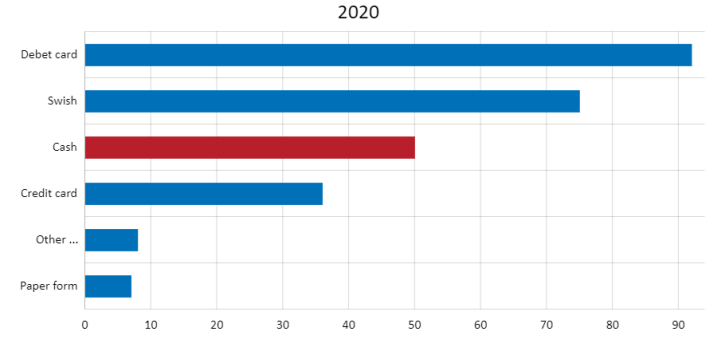Payments in Sweden 2020
Press release Cash usage is at the lowest level ever. Less than one-tenth of all payments are made in cash. Instead, people in Sweden are paying more often by card or the app Swish. This trend has grown stronger during the coronavirus pandemic. To prepare for a future in which fewer and fewer people pay in cash, the Riksbank is investigating the possibility of issuing digital cash – the so-called e-krona. It is also important that those who want to use cash should be able to continue to do so. These are the conclusions in the latest report, "Payments in Sweden 2020".
Swish is now used more than cash
The Swedish people’s answer to the survey question “What means of payment have you used in the last 30 days?”, percentages. Several response alternatives are possible.

Cash usage is at the lowest level ever
The Riksbank’s survey shows that, this year, 50 per cent of people in Sweden have used cash in the last 30 days, compared with 93 per cent in 2012. The proportion of Swish payments is increasing steadily and people in Sweden now pay more often with Swish than in cash. According to the survey, 75 per cent of people in Sweden have paid using Swish over a 30-day period.
This trend has grown stronger during the coronavirus pandemic
During the coronavirus pandemic, the Swedish people have chosen to pay more often by card or Swish, instead of in cash. Even elderly people have started to use Swish more during the pandemic. The proportion of contactless payments in shops has also increased in conjunction with the limit for contactless payments being raised from 200 kronor to 400 kronor in April.
The Riksbank is preparing for the payments of the future
In preparation for the future, the Riksbank is investigating the possibility of issuing a so-called e-krona, and is cooperating internationally with other central banks on this ‘digital cash’. The Riksbank is also cooperating with other central banks to improve cross-currency payments. The Riksbank is also making preparations to allow instant payments, such as Swish, to be made using the Riksbank’s system.
However, some groups in society find it difficult to cope without cash. For example, over half of all people over 65 state that they are negative towards the decline in cash usage. It is the Riksbank’s opinion that those who want to use cash should be able to continue to do so. It is also necessary that payments in Sweden can continue to function in times of crisis and heightened alert.
ABOUT THE PAYMENTS IN SWEDEN REPORT
The report Payments in Sweden describes and analyses developments on the retail payment market and the services offered by the Riksbank. It is published once a year, starting 2019. The report summarises developments over the past year and presents the Riksbank’s assessments and policy in the area. The aim is for the report to contribute to a knowledge-based debate and make it easier for external parties to monitor, understand and evaluate the Riksbank’s policy on the retail payment market.
